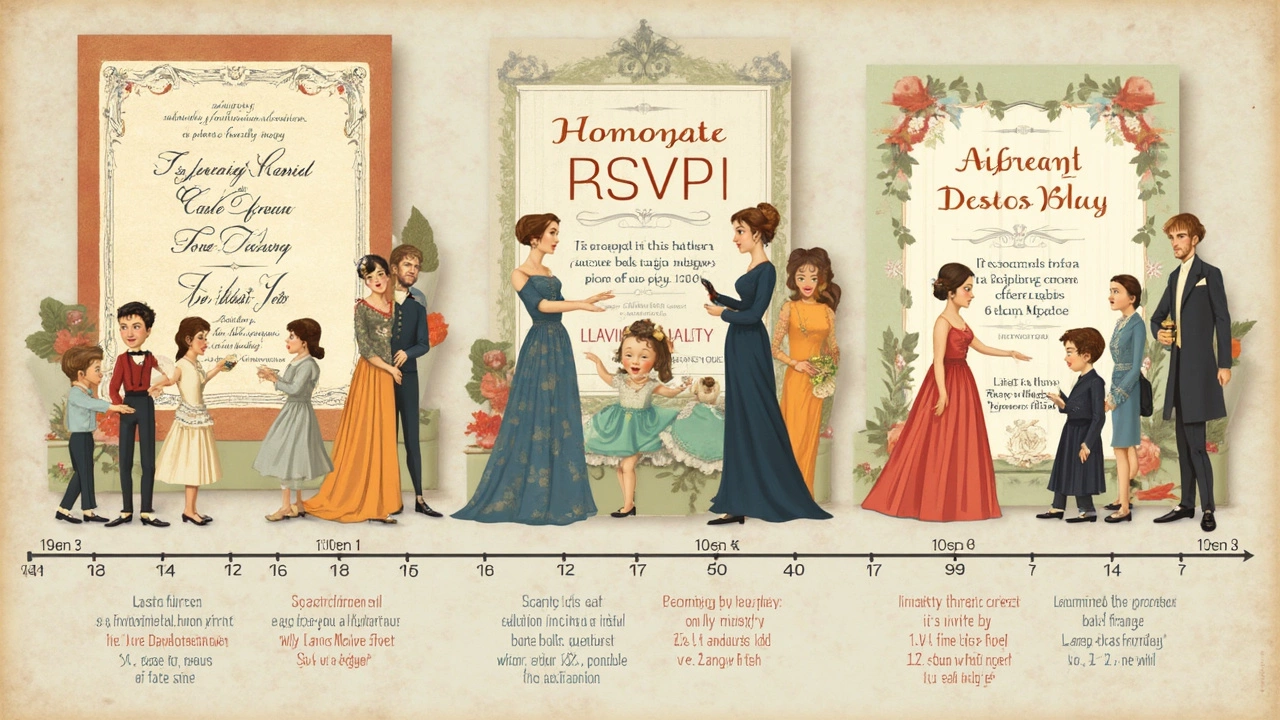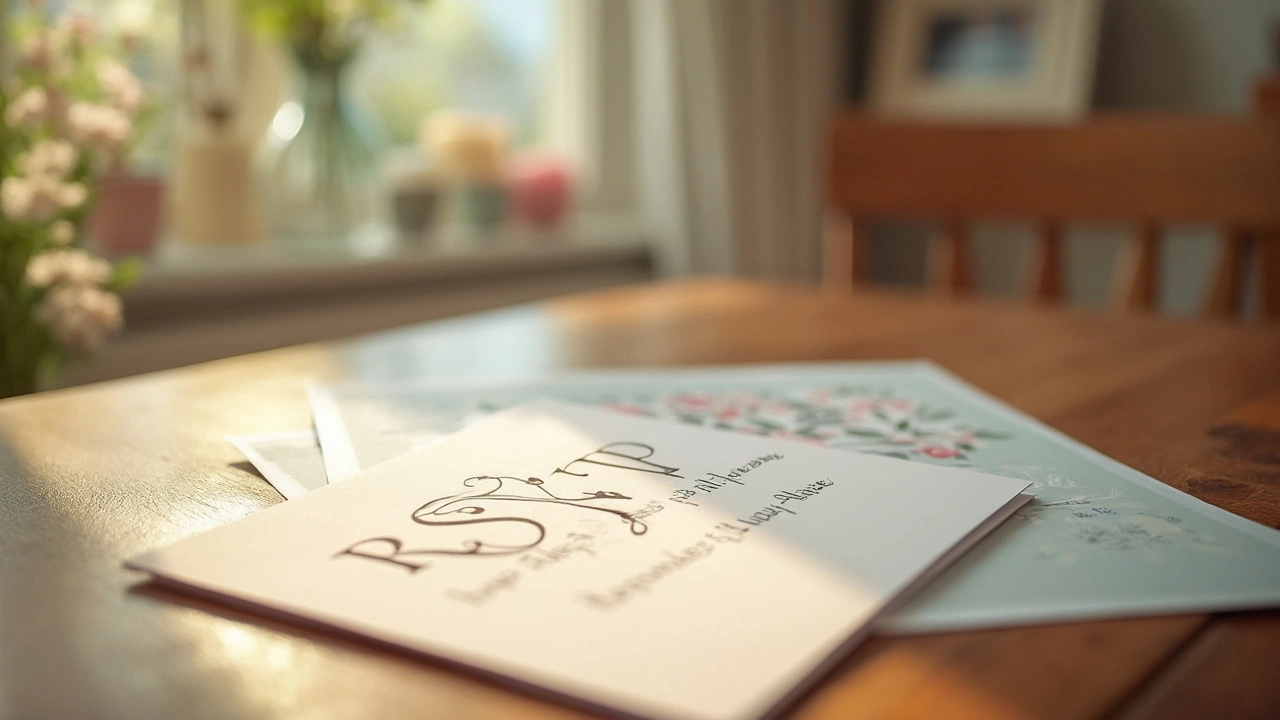Your inbox dings, and there it is: an elegant invitation, maybe to a wedding or a birthday bash. Somewhere near the bottom, you spot it—RSVP. Maybe you’ve never given it much thought, or maybe you’ve wondered why hosts always seem to add those four mysterious letters. Believe it or not, that little acronym actually holds centuries of social history and etiquette, all riding right on the back of that single mysterious "V."
Where Did RSVP Come From?
None of us invented RSVP; it actually has roots way back in 18th-century France. Before texts and email, the French upper class loved lavish soirées, dinners, and events—much like today, but with more powdered wigs. They needed a polite way to check if their guests would attend, so they coined the phrase "Répondez s’il vous plaît." That mouthful literally means, "Please respond." Now, about that "V" you’re curious about? It comes from "vous," which means "you" in French. So the full phrase is aimed at the guest: "Please, *you* respond."
As French influence swept through Europe, their elegant formality stuck. English-speaking hosts started using "RSVP" to make party planning less guesswork and more organization. Over time, RSVP hopped the Channel, rode some steamships, landed in Britain, then in the US, Australia, and all across the world—including right here in New Zealand. Today, hardly any fancy invitation skips that line, especially if someone worked hard to get the headcount right.
So, the next time you see RSVP, remember, you’re being asked, as one individual guest, to let the host know if you'll be there. That single letter, the "V," is aimed straight at you. Miss it, and your host might be left second-guessing cake slices and chair numbers. Plus, it's one of those rare moments when using just one letter makes you a good guest.
Why Is Responding to an RSVP So Important?
Think about the person throwing the event. Maybe it’s a small dinner, a big wedding, or a fundraiser where food, seats, and drinks are carefully counted. An accurate RSVP means less waste, fewer awkward moments, and more great experiences for everyone involved. Not responding can actually throw the whole thing off—people end up scrambling for more food, or worse, chairs are left empty. For the host, it's not just about manners; it's about practicality. In New Zealand, where catering costs aren’t exactly pocket change, it really makes a difference if people reply on time.
Surprisingly, data from surveys done by event planners in 2023 found that over 30% of invitees in Australasia either didn’t reply at all or responded after the deadline. That’s a lot of guesswork for the host, and even more room for mistakes. Flaky RSVPs have led to waste or extra expense in about 45% of mid-sized events, according to a 2022 global events report. Now, if you ever found yourself at a wedding where the food ran out early or seats were randomly shuffled—you might just blame missed RSVPs.
| Region | % Guests Responding On Time | Waste/Extra Expense Due to Late RSVPs |
|---|---|---|
| New Zealand | 61% | 42% |
| Australia | 63% | 40% |
| UK | 67% | 36% |
| USA | 69% | 34% |
It’s not just about heads for counting. Thoughtful hosts use RSVP numbers to manage table settings, print name cards, organize dietary requirements, and make sure nothing falls through the cracks. By replying promptly, you spare the host those awkward "Do you think she’s coming?" moments an hour before the event starts. If you’re the kind of person who likes things organized, think of your RSVP as a tiny act of kindness—they'll thank you for it!

RSVP Etiquette: Doing It Right
You’ve probably seen RSVP requests a dozen times by now. Sometimes you’re invited by post, sometimes by email, or even as a quick text. No matter the method, the rules for being polite don’t really change. Here’s what to keep in mind if you want to be a top-tier guest:
- RSVP on time. The date isn’t a rough guideline—it’s usually set by the caterer or venue. Missing the deadline could mean your seat or meal goes uncounted.
- Be clear. Don’t just write “Maybe.” The host needs a Yes or No, not a cliffhanger.
- Don’t ignore dietary questions. If the RSVP asks about allergies or meal preferences, double-check before replying. That way, nobody gets surprised by a plate of peanuts or a steak they can’t eat.
- Ask the host before bringing extras. If the invitation doesn’t mention a plus-one or kids, playing it cool and checking first is still the way to go.
- Change of plans? Tell them ASAP! Life can throw curveballs, but letting your host know early makes it so much easier to adjust.
- Send regrets gracefully. If you can’t make it, a kind note shows you care about the invite—it’s not a stony silence.
If you follow these simple tips, you’ve actually mastered centuries-old etiquette—without ever stepping foot in a French manor. Smart, right?
Common RSVP Mistakes and How to Avoid Them
Even with the rules spelled out, RSVP drama still happens. Here are a few classic blunders to watch for, and some handy ways to dodge them next time.
- Assuming your partner or kids are invited. Unless the invitation says "and guest" or lists your family, don’t show up with extras. The fun police won’t hunt you down, but the host may be stuck in a tight spot.
- Missing the response date. Life gets mad busy. Jot down the RSVP deadline when you spot it. Set a calendar alert or stick the invite on your fridge.
- Sending half-answers. "We’ll see if we can make it" is tempting if your weekend is nuts, but it leaves your host stuck. Reply yes or no as soon as you know.
- No-showing with no notice. Things happen; if you can't make it, letting your host know is way easier for everyone. Ghosting is best left to horror movies.
- Email RSVP ignored? If you send a digital reply and don’t hear back, a gentle follow-up—especially close to the date—won’t hurt. Sometimes emails go missing in junk folders.
Pro tip: When in doubt, pick up the phone. Ten seconds of chatting clears up weeks of confusion. Friendly and straightforward makes you the guest everyone wants back again.
Hosts actually rank timely, honest RSVPs higher than fancier gifts or showy arrivals. That’s straight from a popular 2023 hospitality survey. So if you want a reputation as the most thoughtful guest, slay with your speedy, clear responses every time.

The Changing Face of RSVP in the Digital Age
Not long ago, every RSVP needed a stamped envelope, a formal card, and a trip to the mailbox. Now? It’s more likely to be an invite by Facebook, a QR code printed on glossy paper, or a text message. The principles remain—respect the reply—but the way we answer has definitely sped up.
Invitations these days can include Google Forms, event apps, or simple WhatsApp messages with RSVP buttons. Hosts often track everything in one handy spreadsheet, swapping out the dusty guest lists of the past. Digital invites make it harder to pretend you “never got the invitation”—your host knows exactly when it landed in your inbox!
Still, the etiquette hasn’t changed. Hosts love a crisp, respectful yes or no, no matter the tech. If there’s a clickable RSVP, use it instead of messaging a maybe on social media. It’s actually faster, and counts for more. Reminder: most digital systems let hosts see who opened, ignored, or replied, so being honest and fast is always best. If you love old-school charm, you can always send a little note or text on top of that digital reply—just for good measure.
With all these tools, hosts now juggle more expectations, from dietary needs to dress codes to party playlists. Some modern RSVPs even have checkboxes for preferences like vegan, dairy-free, or gluten intolerance, or ask for song requests in advance. If you reply thoroughly, you give everyone a better night—yours included.
One last tip if you’re hosting: spell out the RSVP deadline clearly, and maybe set reminders for your guests. And if you’re replying, get it done early—you’ll be making someone else’s job a heck of a lot easier. That little "V" in RSVP may be a tiny letter, but it sure packs a lot of meaning.

